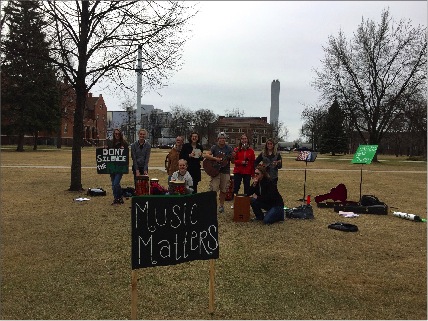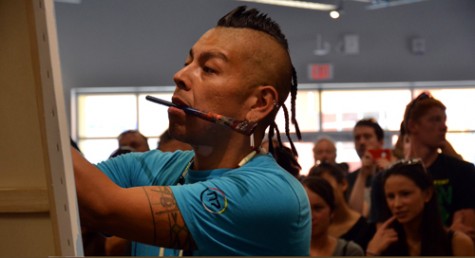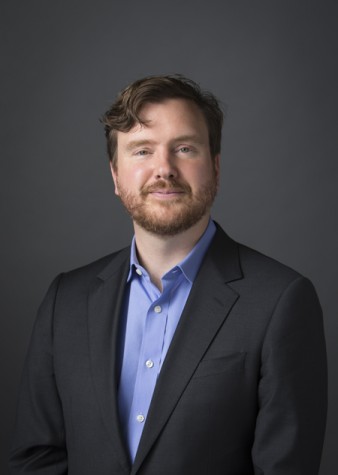Budget cuts or arts and humanities cuts

Students gathered in the quad to demonstrate the importance of music therapy at UND. photo by Ekram Kofiah/The Dakota Student
Students of the music therapy program gathered in groups and spread across the area between O’Kelly and Merrifield. They carried and used their instruments to demonstrate why music therapy shouldn’t be suspended.
Other students who passed by were asked to sign petitions that would hopefully help keep the program alive. These students were subjected to an unreconciled decision made on their behalf. “It’s very important to keep music therapy, because it’s such a growing field. Right now North Dakota is a leader in music therapy and cutting this program would put us years behind,” Melea Hoeffner said.
It is evident that this program is important and essential to students, faculty members and the future of therapy, but why were these students not included in the decision making?
Emily Wangen wrote a letter that was published in the Grand Forks Herald asking UND’s administration to seriously consider the detriments of this suspension and to put into account the students they’re pushing to the side.
“I am appalled at the way the UND administration is handling the budget reduction process,” Wangen wrote.
“Students invest thousands of tuition dollars in UND each year, for which they deserve an exceptional education. They also deserve to be dealt with fairly and honestly during this process.”
How many students have had or continue to have no idea about what is going on with UND’s budget cuts?
The suspension of the music therapy program is alarming not only because of its consequences but precisely because the administration has been making decisions our behalf. Those of us who are sincerely concerned must ask a lot of questions, but frequently, we only end up with more confusing and partial answers.
The dean of Arts and Sciences, Debbie Storrs, said in an article published in the Grand Forks Herald that the music therapy program “will change things in music and I recognize that but it’s the reality we’re dealing with.”
One ought to question their reality that consists of economic thinking and areas of growth. It is obviously not the same reality students are living in. The administration and students live in two different worlds, and students are the ones forced to continue dealing with decisions they had no role in and yet concern them entirely.
Beatrice Marovich is a scholar of Christianity and women and religion. It has been made official that her position will be cut after the 2016-2017 academic year.
In other words, UND will have no dedicated, high-quality professors for courses in contemporary Christianity or in women, gender and religion. In light of today’s political, social and cultural events the compromising of such a valuable faculty member and expertise prevents students from learning crucial subjects.
Rebecca Rozelle-Stone, director of Women and Gender Studies, said, “Students who are not prepared to understand or think critically and sensitively about these issues of identity and dynamics of power will not be on par to be the sort of global citizens and influences that UND wishes to create.”
Why are students kept in the dark regarding the endangerment of certain programs until it is too late? What is the future of other arts and sciences programs, faculty members and students? These are questions concerning to all of us who truly care about the quality of education.
Ekram Kofiah is a staff writer for The Dakota Student. She can be reached at [email protected]













